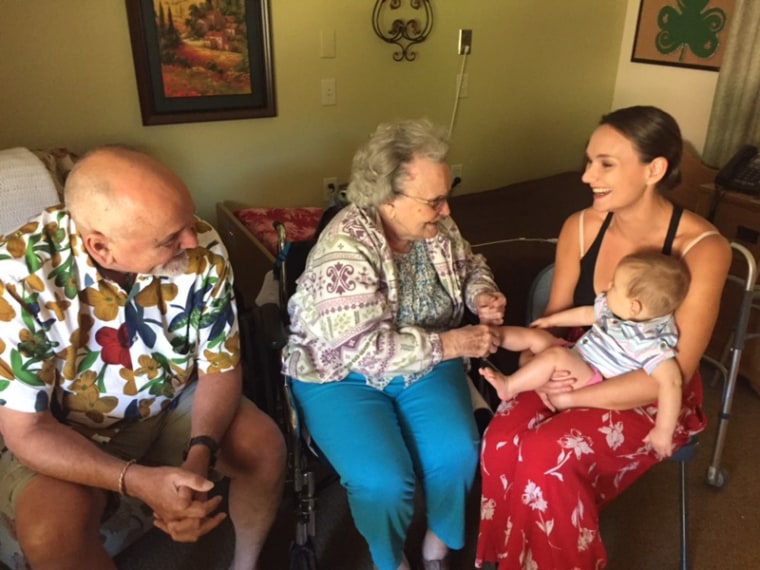January 27, 2021
How to Talk to Kids About Loss to COVID-19
A psychologist shares 4 tips to make this difficult conversation easier for parents.
Jan. 27, 2021, 1:59 PM PST / Source: TODAY By Kait Hanson
Like thousands of others, Julie Zack knows the pain of losing a relative to COVID-19. Her grandmother, MaryAnn Zack, died in a long-term care facility in California in late January due to coronavirus.
“I’m across the country from my family right now,” Zack told TODAY Parents, noting that the distance and inability to properly celebrate her grandmother’s life have contributed to her pain.

Left to pick up the pieces in her own fractured grieving process, Zack has faced another daunting task: explaining the loss to her children.
“My oldest is 3 and he’s just starting to understand family connections,” the mom of two said. “What I know (is that) both he and my younger toddler understand emotions. They know mommy has been sad for days.”
Dr. Shannon Curry, clinical psychologist and director of the Curry Psychology Group in Orange County, California, said a child’s ability to cope with and understand the death of a loved one depends significantly on how clearly and calmly their parent presents the news.
“Children as young as 2 years of age are able to detect when there has been a shift in the family’s dynamic, so they’ll know that something is wrong,” Curry told TODAY. “As long as you’re not overwhelmed by emotion, allowing your child to see the reality of your sadness can be an important teaching opportunity about emotional awareness and coping, while also preparing them for the grief they may witness among family members in the coming days, weeks and months.”
If children seem initially worried by your sadness, Curry suggested naming the emotion and focusing on the positive aspects. She shared this example of what to say: “Mommy is sad right now and I’m crying because after I cry I feel a lot better.”
Zack said she has employed this tactic with good results.
“Young kids like to be helpful, so it’s been good to ask them to give me hugs and kisses to help mommy feel better,” she said. “I make sure to smile for them when they do.”
Curry explained that most parents worry about what they should and shouldn’t say about a loved one’s death.
“As a general rule of thumb, be honest, clear and succinct,” she said. “Regardless of your child’s age, you’ll want to set the stage for an important conversation by asking them to stop whatever it is that they’re doing and come sit down with you.”
For parents facing the task of talking to their kids about the death of a loved one to COVID-19, here are four tips to start a conversation in a way that feels approachable.
1. Speak slowly
“We tend to speak quickly when talking about difficult topics,” Curry said. “This can be especially problematic when talking to a young child about death since they will have a harder time understanding and remembering new concepts when they’re feeling strong emotions. Slow down your speech until it feels strange and pause for three to five seconds between sentences, allowing them time to take in the information.”
2. Answer questions honestly
Young children think in concrete, literal terms.
“Well-intentioned attempts to explain death to children using euphemisms like ‘going to sleep,’ ‘passing away’ or ‘losing someone’ can confuse and scare little ones who may not be able to make sense out of why going to sleep has suddenly made everyone so sad,” Curry explained.
3. Use age-appropriate language
Be as specific as possible to prevent any potential misunderstanding.
Curry shared the following example as a guide:
“Grandpa Joe was at the hospital because he was very sick with COVID-19. The doctors tried as hard as they could to make him better but his sickness got so bad that it made it very hard for Grandpa to breathe. The doctors tried to help him breathe but they weren’t able to and when he stopped breathing he died.”
4. Address fear
Learning about a COVID-related death may cause a child to become preoccupied with fear that the virus will take their parents as well.
“Here again, an honest and yet reassuring response is key,” Curry said. “Incorporating words like ‘I expect,’ ‘most’ and ‘usually’ can help guide you. For instance, you might tell your child that most people do not die until they are very old.”
As is true for adults, Curry reminds parents there is no right or wrong way for children to grieve:
“By approaching your child’s grief process with the same openness and acceptance that you brought to the topic of death, you can help them to understand these experiences as inevitable aspects of life and ones that they can manage while looking forward to the future.”





